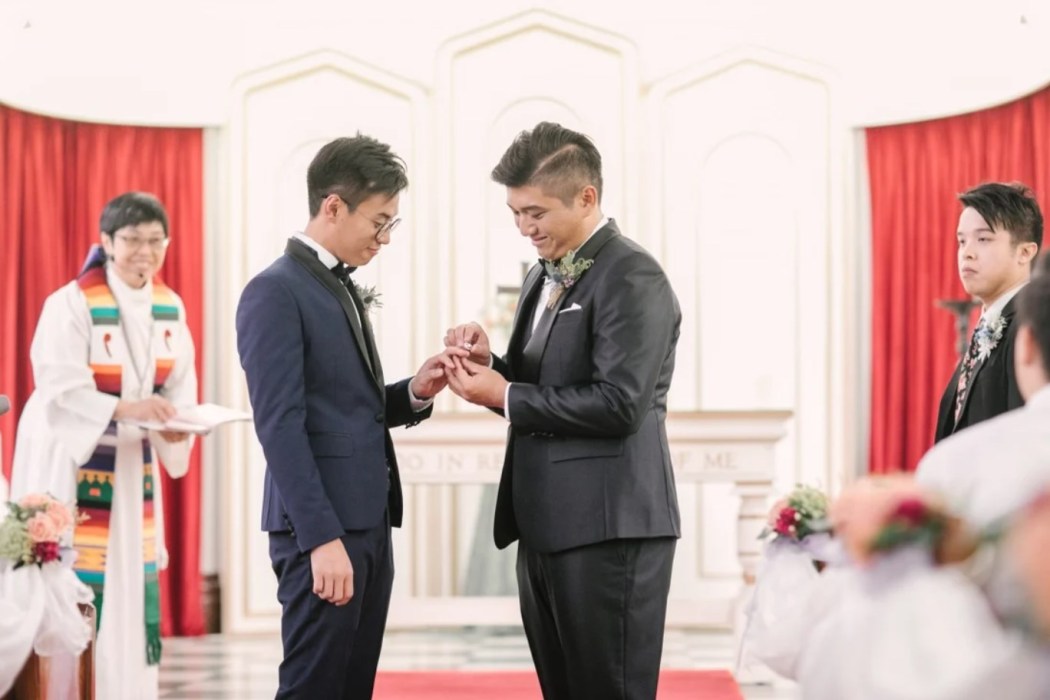Gay married couples are not comparable with straight ones owing to “intrinsic biological differences” and therefore should not be afforded equality when seeking subsidised government housing, a Hong Kong court heard on Thursday.

Justices Jeremy Poon, Aarif Barma, and Thomas Au of the Court of Appeal oversaw the second day of an appeal filed by the government to seeking to overturn rulings that resulted in victories for gay couples seeking equal rights.
A lower court previously held that the Housing Authority (HA) – which oversees both government-subsidised rentals and home ownership schemes – acted unconstitutionally when it prevented same-sex couples who married abroad from applying for public housing.
The hearing was a combined appeal against two cases. The first applicant was Nick Infinger, a Hong Kong permanent resident rejected from applying for public rental housing (PRH) with his partner in 2018. The second applicant – Henry Li – was not allowed join as a co-tenant in a government-subsidised flat owned by his late partner under the Home Ownership Scheme (HOS) as a spouse, without paying the government a hefty premium of HK$2.4 million.

Senior counsel Abraham Chan, who argued on behalf of the government, said equality could only be considered between gay and straight married couples on the basis that the two kinds of relationships are comparable.
However, the “intrinsic biological differences” between the two – meaning two individuals of the same sex or individuals of the opposite sex – means that it would not be possible to compare them without judges resorting to value judgements.
‘Procreative potential’
“It is plainly relevant that heterosexual married couples as a category have reproductive capacities and procreative potential which same-sex couples lack,” the government wrote in its submissions. The difference on whether the couples could procreate is decisive, as housing policies support the government’s goal to promote population growth, it claimed.
On the other hand, allowing gay couples to join the pool of applicants for housing may result in longer waiting times for heterosexual couples, which will – in turn – negatively impact their plans to have children. This would be inconsistent with the housing policy’s aim of encouraging the formation of “traditional families,” according to the government counsel.

However, the applicants’ lawyers argued that government housing was also given to those who had no marital relationships, such as siblings, parent-and-child situations, or those who were beyond the age for childbearing. The practice demonstrated a clear disconnect with the agency’s claim that its aim was to foster formation of families.
The authority’s role is to enforce the social welfare policy of distributing subsidised housing based on financial need, and not sexual orientation, the counsels said. The agency has no authority to enforce the city’s matrimonial laws, a role reserved for its immigration authority. Excluding gay couples from being eligible for subsidised housing is to disregard the primary purpose of providing welfare to those in need, they said.
‘No-brainer’
Infinger’s counsel Tim Parker submitted that the court should consider whether it is proportional to grant subsidised housing rights to gay couples when it causes a negative impact to others. The choice is between extending the currently extremely long waiting time for all housing applicants by an unknown duration, or denying a minority access to subsidised housing. “It’s a no-brainer,” Parker said.
Meanwhile, Li’s senior counsel Jin Pao asserted that there was no conflict between the constitutional right for all to be treated equally before the law, and the right for them to marry and raise a family freely under article 37 of the Basic Law. “Asserting equality does not undermine the freedom to marry among other Hong Kong heterosexual couples,” Pao said.

And by denying gay couples the right to be co-tenants in an HOS flat that one of the spouses purchased, the policy penalises gay people even before they marry, Pao argued.
“Even if a homosexual man has no intention to marry, he would still have to think twice whether to purchase an HOS flat, because he would not be able to – in the future – marry someone else and live with them,” he said. The policy is “blatant and crass” discrimination against a person, leaving them with the alternatives of living separately from their future spouse, or buying or renting a flat in the private market.
“We do question why this group of people – a minority of a minority… why they should shoulder such a heavy and harsh burden in the name of an unquantified and unknown benefit to ‘traditional families’?” he said.
Support HKFP | Policies & Ethics | Error/typo? | Contact Us | Newsletter | Transparency & Annual Report | Apps
Help safeguard press freedom & keep HKFP free for all readers by supporting our team

LATEST FROM HKFP
HKFP has an impartial stance, transparent funding, and balanced coverage guided by an Ethics Code and Corrections Policy.
Support press freedom & help us surpass 1,000 monthly Patrons: 100% independent, governed by an ethics code & not-for-profit.










